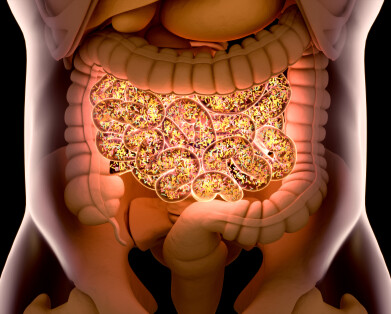Research news
Decoding how gut bacteria feed on mucus sugars
Jan 31 2025
Beneficial microbe Akkermansia muciniphila plays a key role in gut health
A bacterium linked to good health, found in the lower gut, has been thoroughly examined and shown to have a highly specialised diet - breaking down sugars found in mucus.
Published today (31 January) in Nature Microbiology, the study offers the first comprehensive analysis of how Akkermansia muciniphila (AM) utilises O-linked sugars in the mucus lining the gastrointestinal tract. Researchers investigated 66 enzymes that AM employs to break down mucins, the key components of this protective layer.
Led by Dr Lucy Crouch at the University of Birmingham, the team used mucus from a pig model to demonstrate how AM enzymes can completely degrade mucin, shedding light on the molecular mechanisms behind microbial sugar metabolism in the gut.
Dr Crouch, a Sir Henry Dale Fellow at the University of Birmingham, explained: “This is the first time we have fully mapped how microbes break down O-linked sugars in the gut. It’s also the first instance where a set of enzymes has been used to completely degrade the glycan portion of mucin. These enzymes could help characterise the different glycans humans produce, which may serve as markers for disease.
“Glycans like these are also receptors for various pathogens and their toxins, including Shiga toxin. By modifying them, we might influence disease severity.
“We also know that AM proteins and outer membrane extracts can have beneficial effects on the host, such as supporting metabolism. Some of these proteins interact with host receptors and may help suppress immune responses. Because AM relies on mucus as a food source, it likely plays multiple roles in host-microbe interactions.
“AM is an important microbial marker of health - higher levels are associated with a well-functioning gut, whereas lower levels have been linked to inflammatory diseases and diabetes. It is also highly sensitive to dietary fibre intake.”
This study provides new insights into how beneficial gut bacteria sustain themselves, offering potential avenues for future research on gut health and disease prevention.
More information online
Digital Edition
ILM 50.2 March 2025
March 2025
Chromatography Articles - Effects of small deviations in flow rate on GPC/SEC results Mass Spectrometry & Spectroscopy Articles - Waiting for the present to catch up to the future: A bette...
View all digital editions
Events
Apr 09 2025 Tokyo, Japan
Apr 22 2025 Hammamet, Tunisia
Apr 22 2025 Kintex, South Korea
Analytica Anacon India & IndiaLabExpo
Apr 23 2025 Mumbai, India
Apr 23 2025 Moscow, Russia






















